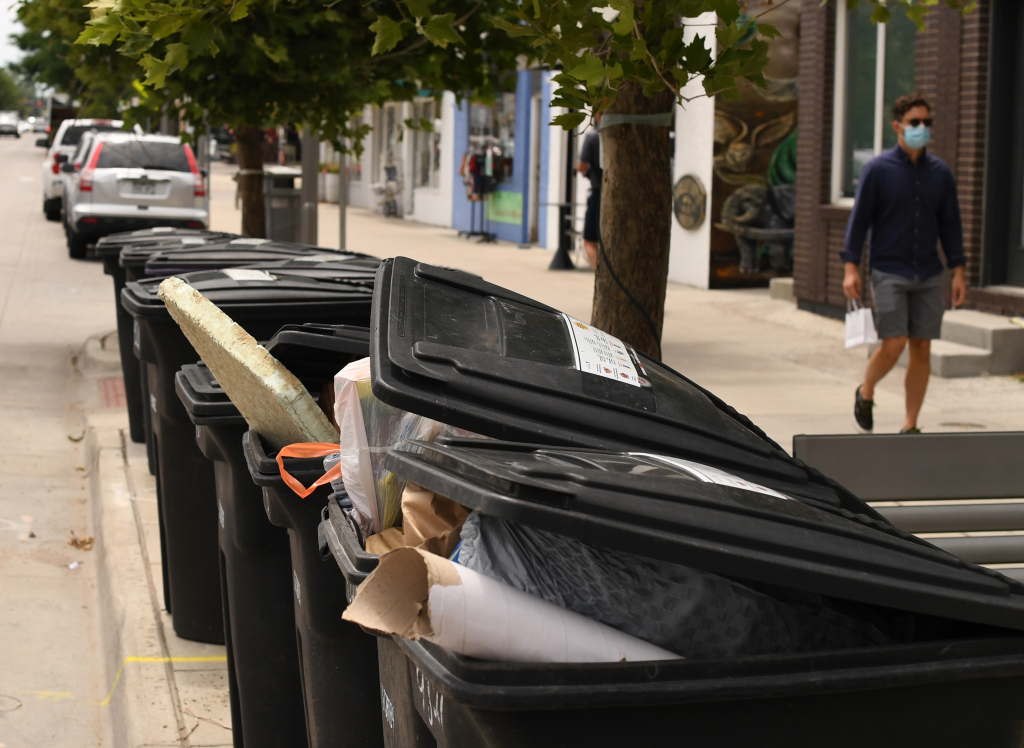Denver City Councilman Jolon Clark doesn’t get his war just yet.
Known for his penchant for environmentally friendly policies, Clark celebrated late last year when he and his colleagues approved a plastic bag fee.
He hoped the measure would encourage recycling, reduce the amount of single-use plastics hitting Denver’s landfills and spark a war on plastics. The war could then extend toward styrofoam containers and other single-use materials, he said.
But then the coronavirus pandemic hit, delaying not only Clark’s war and the start of the plastic bag fees but also generating more trash and recycling for the city’s solid waste division, pushing its staff to the limit. City officials have also paused talks of launching a pay-as-you-throw garbage collection system as well, among other things.
“Like many things the COVID has brought to its knees,” Clark said with a sad laugh.
The need for these measures hasn’t gone away, he said. Rather, it’s increased. But the city missed the opportunity. Now facing an economic crisis, Denver likely can’t afford to launch a new program — not in the short term, anyway — and residents can’t afford any changes on their utility bills.
So they’ll wait, Clark said.
Indeed, Denverites are throwing more trash into their home containers, recycling at a higher rate and composting more, said Charlotte Pitt, interim director of Denver’s Solid Waste Division.
“People are now staying at home, working at home, getting more stuff delivered,” Pitt said. “It’s just natural that we’re going to see more waste.”
In all, through the halfway point of the year, Denverites in single-family residences and small apartment buildings threw away 10% more trash, said Nancy Kuhn, spokesperson for the city’s Department of Transportation and Infrastructure. Recycling is up 22% and composting is up 47%.
Translated into weight, Denverites threw away 8,128 more tons of trash, recycled 3,984 tons and composted 1,591 tons, Kuhn said.
Even extra trash — monthly pickups for bigger bags, furniture, mattresses and more — is up 27% or 2,343 tons, Kuhn said.
These increases are likely offset by a decrease in commercial trash and recycling, Pitt noted.
But that commercial trash and recycling is picked up by private companies, so the residential increases have led to more work for Denver crews.
Because there’s less traffic on the roads, the crews have been able to manage the extra workload, Pitt said.
However, they have needed to make adjustments.
Before the pandemic, crews would go around the city picking up so-called extra trash — like furniture and appliances — every four weeks.
More loads of extra trash means more trips back and forth from the landfill, Kuhn said. To cope, crews have transitioned into smaller, more manageable routes for extra trash pickups.
In addition, crews have been forced to reduce extra-trash pickups to every eight weeks instead of every four weeks, Kuhn said.
So far, those are the most significant changes the division has needed to cope with the added work load, but if the trend continues for much longer or increases, it will need more cash and staff to handle the tonnage, Pitt said.
“It’s very tight,” Pitt said.
She welcomed the boost in recycling and composting and noted the diversion rate is currently around 24%, meaning that nearly a quarter of the city’s waste is captured for recycling.
But that figure could be much higher had a pay-as-you-throw system been in place before the pandemic hit, underscoring a need for the change at some point in the future, Clark said. The idea is to change behavior, financially incentivizing recycling and throwing away less.
Pitt agreed and said her department is already working to change those behaviors by encouraging people to be mindful of the single-use plastics they rely on and looking to recycle materials whenever possible. But a pay-as-you-throw trash system would further encourage those behavior changes, she acknowledged.
The conversation isn’t over, Pitt said. It’s only on hold. And there’s still up to a year and a half worth of work before a new system could begin.
Within the next six months, Pitt said she anticipates her team will resume community conversations about how best to launch such a new system.


















